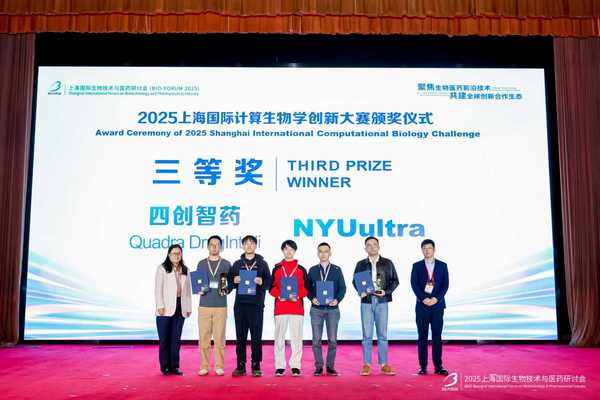On October 29, the award ceremony of the 2nd Shanghai International Computational Biology Challenge was held. The ShanghaiTech team “Quadra DrugInteli,” comprising undergraduate students from the School of Life Science and Technology (SLST) and the School of Information Science and Technology (SIST), secured the third prize with an overall fourth-place finish.

The challenge attracted 118 teams from China, the United States, the United Kingdom, Canada, and other countries, and received a total of 113 submitted abstracts. In the competition, being the only undergraduate team among the five that successfully advanced to the grand finals, “Quadra DrugInteli” demonstrated a spirit of bold exploration and innovative capability. The team’s members included Chen Keyu ’26, Lin Wuyi ’27, and Wang Mohan ’27 from SLST, and Chen Yixuan ’27 from SIST. Associate Professor Bai Fang from SLST instructed the team.
This year’s challenge focused on a new target in the G protein-coupled receptor family—Hydroxycarboxylic Acid Receptor 1 (HCAR1)—first discovered by Shanghai-based research teams. This target plays a crucial role in lactate signaling-mediated tumor immune escape mechanisms. However, effective inhibitors for HCAR1 remain elusive, and the protein’s inhibited-state structure leaves unknown. Participating teams were required to utilize AI technology to efficiently screen candidate molecules from millions of compounds and validate their specificity and activity through experiments.
Drawing on the technical expertise of Prof. Bai’s lab in AI drug design, the team innovatively proposed a multi-level screening strategy of “seeding—compound space expansion,” fully integrating the advantages of AI and physical models. Leveraging ShanghaiTech’s powerful computational resources, the teams built a screening system that balances speed and accuracy.
Among the 10 candidate molecules submitted by the team, four demonstrated good activity upon “wet lab” validation, with the top-performing molecule ranking second in inhibitory bioactivity against the target among all entries.
Prior to this competition, two ShanghaiTech’s teams had already won first and second prizes respectively in the inaugural competition in 2023, showcasing the university’s solid academic strength in computational biology. With strong support from the University Library and related research platforms for computational biology studies, ShanghaiTech continues to deepen its efforts in AI for science.

